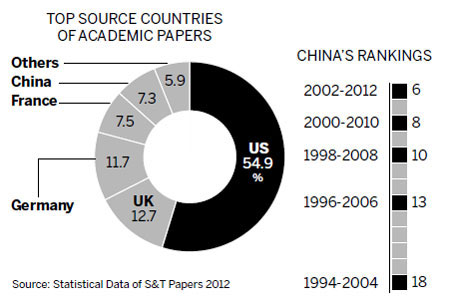Quality of academic papers rises
Updated: 2012-12-08 08:00
By Cheng Yingqi (China Daily)
|
|||||||||||

Chinese academic papers in the science and technology field have been criticized in the past for their high volume and low quality. However, recent research results show that the quality of papers in China is increasing.
On Friday, the Institute of Scientific and Technical Information of China published its annual report, the Statistical Data of Science and Technology Papers 2012.
According to the report, between 2002 and 2012, 7.3 percent of the top 1 percent most-cited papers were from China, making the country the world's fifth-largest producer of high-quality papers, after the United States, the United Kingdom, Germany and France.
From 2001 to 2012, Chinese scientists published altogether 1,022,597 science and technology papers, ranking second across the globe. These papers were cited 6,653,426 times, the sixth-highest result globally.
Out of the 17 countries and regions in which the papers were cited more than 200,000 times in the past decade, China ranked 14th in terms of the average citation rate.
"At this growth rate, the overall citation rate of China's science and technology papers is likely to become the fifth highest in the world by 2014, which is six years ahead of our target," said He Defang, director of the Institute of Scientific and Technical Information of China.
"Some people believe that since we have so many researchers and so many institutes in China, it is a natural result that we have fruitful science and technology results, but I have to say that they are wrong," said Wu Yishan, deputy director of the Institute of Scientific and Technical Information of China.
In 1992, Harvard University published 6,701 science and technology papers, which was two times the overall number of papers published by all the universities and research institutes in Beijing that year.
"We had so many universities and institutes in Beijing, and 20 years ago the number of science and technology papers was half of that one university. No one expected we would achieve so much progress, becoming the world's second-largest country for science and technology papers output, so we should be confident about our development," Wu said.
Development, however, will not be possible without mechanisms to boost reform.
"We reformed our evaluation system to encourage researchers to focus more on the quality of their papers, which has been quite effective," said Xu Jingjun, vice-president of Nankai University in Tianjin.
In the past, associate professors were required to publish a certain number of academic papers before they were granted the professor's title, but Nankai University canceled this rule.
"Now they just have to submit a single paper, one that he or she believes represents their best level. And we hand out that paper to the top scientists both inside and outside China and let them assess the value of the work," Xu said.
Xu added that the professor title is then given if the scientists recognize the quality of the paper.
In 2011, 42.58 percent of the academic papers published by Nankai University were cited more often than the world-average level. Ten years ago, only 12.5 percent of the university's papers reached the average level.
chengyingqi@chinadaily.com.cn
Related Stories
Foreign academics wanted in Shanxi province 2012-09-04 16:34
9th FAST Youth Academic Meeting opens in Fuzhou 2012-08-26 09:31
Academic fraud tough to beat 2012-07-18 08:05
Chinese academic takes senior post at Harvard 2012-08-21 08:05
Today's Top News
President Xi confident in recovery from quake
H7N9 update: 104 cases, 21 deaths
Telecom workers restore links
Coal mine blast kills 18 in Jilin
Intl scholarship puts China on the map
More bird flu patients discharged
Gold loses sheen, but still a safe bet
US 'turns blind eye to human rights'
Hot Topics
Lunar probe , China growth forecasts, Emission rules get tougher, China seen through 'colored lens', International board,
Editor's Picks

|

|

|

|

|

|





